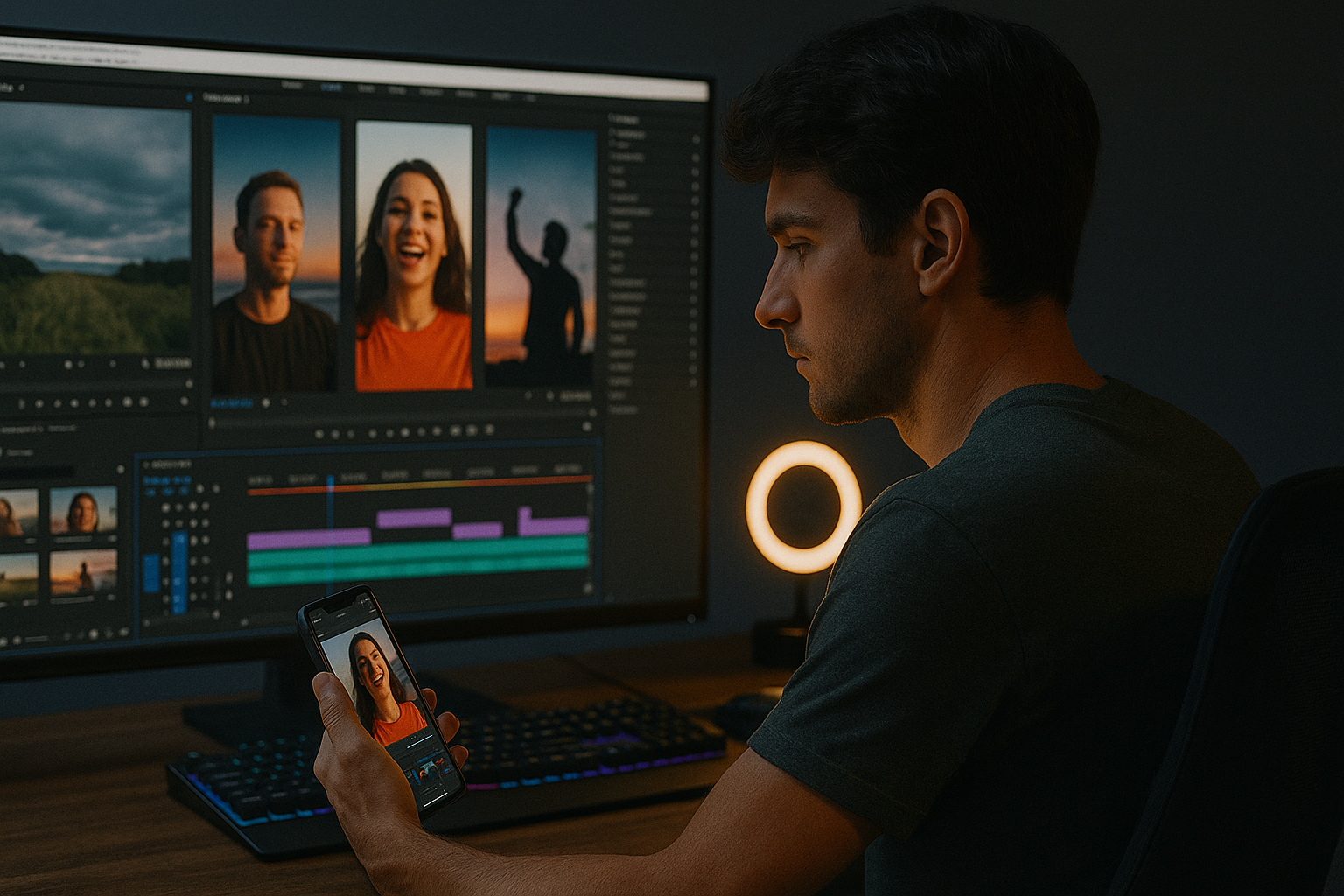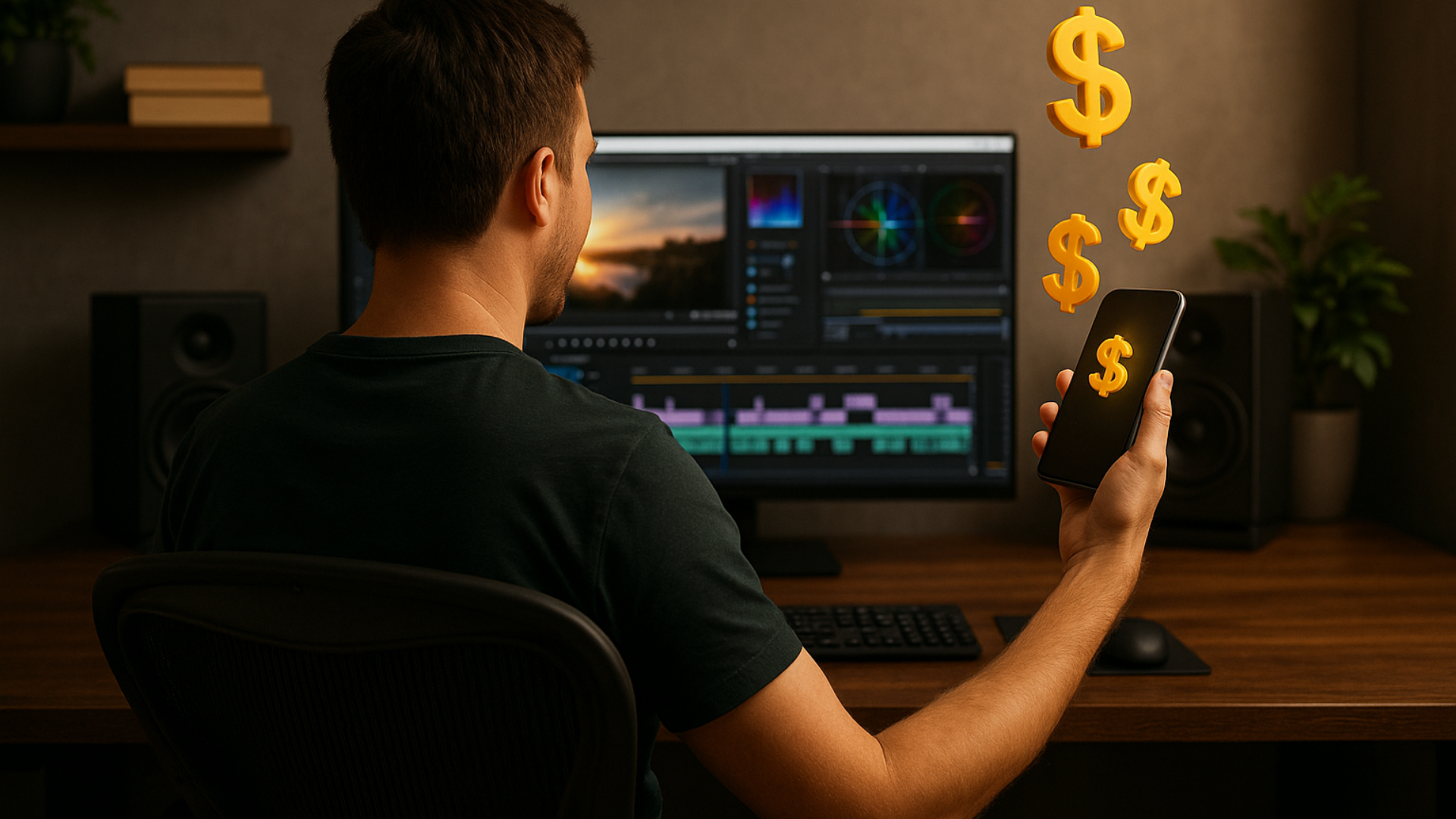Editors Don’t Rely on Luck – They Rely on Technique. And Here, You’ll Learn the Best Ones.
1. Master the Art of Visual Storytelling
Storytelling is the emotional engine behind every powerful video. As an editor, your role is to turn raw footage into stories that connect.
Step-by-step + real-world example:
-
Study storytelling structures
Example: When editing a product launch video, apply the 3-act structure — start with the problem, show the product in action, finish with the transformation. -
Analyze successful videos
Example: Watch a Nike commercial and observe how the editing builds tension, releases energy, and follows a story rhythm. -
Practice with personal projects
Example: Make a 60-second mini-doc about your daily editing routine, using pacing, music, and effects to shape the narrative. -
Ask for feedback
Example: Share the video in an editor’s group and ask: “Did the pacing hold your attention till the end?”
2. Improve Your Technical Skills
A solid technical base gives you creative freedom. When you understand how tools work, you spend less time fixing and more time creating.
Step-by-step + real-world example:
-
Master your editing software
Example: In Premiere, set custom keyboard shortcuts to speed up editing — like Q/W for trimming, Ctrl+D for transitions. -
Learn codecs and formats
Example: Export social content in H.264 for light delivery, but use ProRes HQ for commercial projects to preserve quality. -
Study color correction and grading
Example: Use waveform scopes to properly balance skin tones during interview editing. -
Stay updated
Example: Spend 30 minutes a week watching tutorials about new features in CapCut, Premiere, or DaVinci Resolve.
3. Use Professional Assets
Using the right tools instantly raises the quality of your videos. Overlays, LUTs, transitions, and SFX help you work faster and make better-looking edits.
Step-by-step + real-world example:
-
Invest in professional asset packs
Example: When editing a music video, use light leaks, transitions, or glitch overlays from the Overlays Essential Bundle to enhance energy and mood. -
Organize your assets
Example: Create folders like “Transitions | Smooth”, “Textures | VHS”, “Flares | Warm” to find effects quickly while editing. -
Use creatively, not just visually
Example: Add a film burn overlay at the start of a drone shot to create a smooth cinematic intro. -
Experiment with combinations
Example: Blend a VHS texture with a clean modern LUT to create a retro–meets–futuristic vibe for fashion content.
4. Build an Efficient Workflow
Editing isn’t just about creativity — it’s also about process. A solid workflow saves time and boosts quality.
Step-by-step + real-world example:
-
Plan before editing
Example: Write a simple script for a wedding highlights video — helps you cut with purpose, not on impulse. -
Organize your files
Example: Create folder structure: “01_Footage”, “02_Music”, “03_SFX”, “04_Graphics”, “05_Export” — with consistent naming. -
Use keyboard shortcuts
Example: In CapCut or Premiere, use “M” to mark music beats and cut on rhythm with the “C” tool (razor). -
Implement structured reviews
Example: Create a pre-export checklist: audio balanced, transitions clean, final fade added.
5. Communicate Professionally with Clients
The way you communicate shapes how clients see you. Clear, professional messaging earns trust and lets you charge what you're worth.
Step-by-step + real-world example:
-
Set expectations from the beginning
Example: Send a clear proposal outlining scope, delivery schedule, and revision rounds. -
Keep the client updated
Example: During a corporate edit, send short progress clips every 2–3 days with a quick message like “Here’s a preview of the intro section.” -
Be open to feedback
Example: Use Frame.io, Google Drive comments, or timestamp notes to streamline feedback rounds. -
Use contracts
Example: Even for small jobs, have a basic agreement covering deadlines, payments, and content rights.
6. Invest in Personal Development
To stay relevant and creative, you have to keep learning. Growth is the real skill behind long-term success.
Step-by-step + real-world example:
-
Join editor communities
Example: Discord or Telegram groups focused on Premiere, DaVinci, or mobile editing are great for daily learning. -
Watch tutorials and webinars
Example: Follow Adobe’s livestreams or YouTube creators that break down real-world client workflows. -
Seek mentorship
Example: DM a more experienced editor and offer a quick collab in exchange for feedback or a video review. -
Set learning goals
Example: “In 30 days, I’ll master seamless text animations in After Effects” — and build sample reels to practice.
7. Value Your Work
Underpricing doesn't just hurt you — it hurts the market. Knowing how to price fairly is part of being a professional.
Step-by-step + real-world example:
-
Calculate your time and costs
Example: If a 1-minute edit takes 6 hours between cutting, reviewing, and delivery — charge accordingly. -
Research the market
Example: Use platforms like Freelance Mile to compare your rates to other editors in your niche and skill level. -
Communicate your value
Example: Highlight how using the Overlays Essential Bundle enhances your work’s visual quality and saves client time. -
Negotiate with confidence
Example: If a client asks for a lower price, offer a smaller package — but don’t reduce your base rate without reducing scope.
Conclusion
Luck might open a door, but it’s technique that builds a career.
If you want to grow as a professional editor, you don’t need luck — just action.
And if you're ready to improve your visual workflow with pro-quality tools, here’s the smartest first step:
Explore the Overlays Essential Bundle
-
2000+ drag-and-drop overlays and effects
-
Categories: transitions, vintage styles, creative FX
-
Works with Premiere, CapCut, Final Cut, DaVinci
-
Includes LUTs, SFX, and step-by-step tutorials
-
Lifetime access and fast results
#editingtechniques #videoeditingworkflow #visualstorytelling #editorproductivity #proeditingassets #overlaysforvideo #howtoeditbetter #creativeeditorworkflow #videoproductiontips #growasavideoeditor



